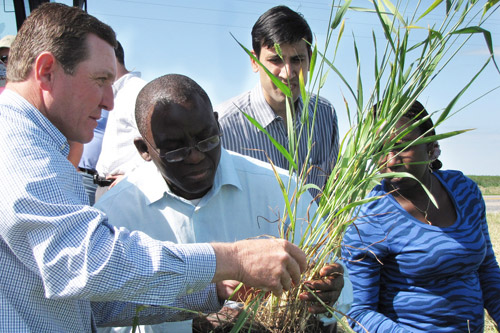This week marks World Trade Week within the U.S. government. Even though every week is world trade week at the Foreign Agricultural Service (FAS), this formal recognition gives the agency the opportunity to emphasize the importance of international trade and how FAS programs directly impact the ability for American farmers and producers to find markets for their products overseas.
One of the ways FAS works to promote U.S. agricultural products overseas is through its market development programs. U.S. Wheat Associates (USW) has participated in several of these programs, including the Market Access Program and Foreign Market Development program.
Last month, U.S. Wheat Associates used FAS’s Market Access Program (MAP) to sponsor a trade visit to the United States for flour milling executives from Nigeria to tell the story of how a partnership between the U.S. government and wheat producers has helped them build the second largest industry in the West African nation. Nigeria buys more U.S. hard red winter wheat every year than any other country and will likely be the largest U.S. wheat buyer in the world in 2009/10 (June-May). As much as 90 percent of the wheat milled in Nigeria is imported from the United States, including hard red spring, hard white, durum, and soft red winter wheat.
“U.S. wheat has also become a basic ingredient for greater economic opportunity in Nigeria,” said USW President Alan Tracy. “Doing business in Nigeria can be difficult, but their milling industry supports thousands of jobs and is still expanding its capacity. We have supported that growth by helping these millers introduce new products like pasta, instant noodles, and cookies into this growing market.”
These market development programs helped provide in-country USW representation, support trade and technical service activities, and allow USW to bring trade teams to the United States to educate buyers, technicians, and government officials about how to get the most value possible from U.S. wheat.
“Whatever we have achieved, the foundation has been laid by U.S. Wheat Associates,” said Mr. Tunde Odunayo, Chairman of Honeywell Flour Mills, Lagos, Nigeria. “We know that USW is funded by farmers and USDA. It is money well-spent.”
Another example of market development program success can be found in U.S. Wheat Associates’ efforts in Indonesia where the organization’s sustained trade and technical service in the emerging Indonesian market has helped increase U.S. wheat sales and share in a market dominated by nearby Australia. Between 2001/2002 and 2006/2007, total U.S. wheat sales to Indonesia were about 1.74 million metric tons (MMT) and the annual market share never exceeded 10 percent. As USW learned that new mills were planned, its representatives encouraged the owners and trained technical managers to produce new flour products made with U.S. wheat to compete in a growing high-quality baked goods market segment.
As a result, the U.S. wheat share increased to more than 15 percent as millers became more satisfied with the results. Since 2007/08, total U.S. wheat sales have exceeded 3 MMT. The incremental sales are worth $252 million to producers from the Pacific Northwest to the Great Plains and the Southeast. At the same time, the effort is helping the Indonesian milling industry build its competitive capacity. This is just another example of how market development programs help cooperators achieve export success.

Wheat producer Jeff Sulak (left) discusses a new hard red winter wheat variety with members of a Nigerian trade team sponsored by FAS cooperator U.S. Wheat Associates during a late-April visit to his farm near Covington, Texas. Left to right, Tunde Odunayo, Vice-Chairman / CEO of Honeywell Flour Mills in Lagos, Nigeria, Rajesh Gaggar is Procurement Manager for noodle manufacturer Dufil Group, and Kikelomo Ayoola is Manager of Commodity Finance for Ecobank PLC. (Courtesy of U.S. Wheat Associates)
